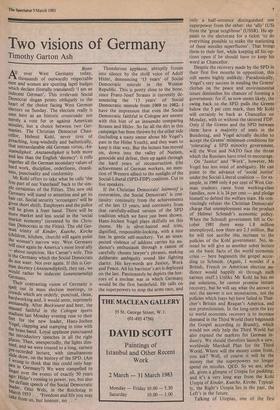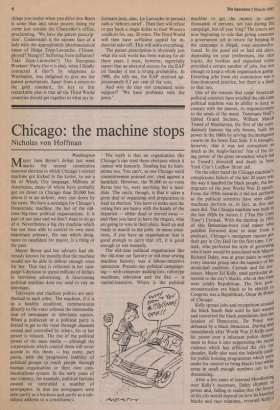Two visions of Germany
Timothy Garton Ash
Aover West Germany today, thousands of outwardly respectable men and women are sporting lapel badges Which declare (literally translated) 'I am an indecent German'. This irrelevant Social Democrat slogan points obliquely to the heart of the choice facing West German electors on Sunday. The election really is seen here as an historic crossroads: not merely a vote for or against American missiles, but a choice between two Ger- nnanies. The Christian Democrat Chan- cellor, Helmut Kohl, never tires of Preaching, long-windedly and bathetically, that untranslatable old German virtue, An- staendigkeit. Anstaendigkeit is both more and less than the English 'decency': it rolls together all the German secondary values of hard work, discipline, orderliness, cleanli- ness, punctuality and conformity. Mr Kohl offers to take what he calls 'the free part of our Vaterland' back to the sim- ple certainties of the Fifties. This new old Germany will stand to attention and get its hair cut. Social security 'scroungers' will be given short shrift. Employers and the police Will be given a freer hand. There will be more market and less social in the 'social market economy' (invented by the Chris- tian Pemocrats in the Fities). The old Ger- man trinity of Kinder, Kueche, Kirche (Children, kitchen, church) will again point the woman's narrow way. West Germany will once again be America's most loyal ally — above suspicion, like Caesar's wife. This is the Germany which the Social Democrats do not want. Not ever again. If this is Ger- man decency (Anstaendigkeit), they say, we would rather be indecent (unanstaendig) Germans.
Their contrasting vision of Germany is spelt out in mass election meetings, to crowds which are orderly, punctual, clean, hardworking and, it would seem, supremely anstaendig. After Bockwurst and beer, the massed faithful in the Cologne sports stadium last Monday evening rose to their feet for the new leader, Hans-Jochen Vogel, clapping and stamping in time with the brass band. Loyal applause punctuated the introductory speeches in all the right Places. Then, unexpectedly, the lights dim- 'fled, and we were treated to a long, earnest pre-recorded lecture, with simultaneous Slide show, on the history of the SPD. (Am I wrong to think that this could only hap- Pen in Germany?) We were compelled to linger over the events of exactly 50 years a_,go: Hitler's coming to power, yes, but also the defiant speech of the Social Democratic leader, Otto Wels, in the Reichstag in take 1933 'Freedom and life you may take from
US, but honour, no ...' Thunderous applause, abruptly frozen into silence by the shrill voice of Adolf Hitler, denouncing '13 years' of Social Democratic misrule in the Weimar Republic. This is pretty close to the bone, since Franz-Josef Strauss is currently de- nouncing the '13 years' of Social Democratic misrule from 1969 to 1982. I have the impression that even the Social Democratic faithful in Cologne are uneasy with this hint of an innuendo comparing Strauss and Hitler. So far all the dirt in this campaign has been thrown by the other side (including a nasty smear about Mr Vogel's past in the Hitler Youth), and they want to keep it that way. But the lecture has moved on, down into the valley of Nazism, genocide and defeat, then up again through the hard years of reconstruction (the achievement of German workers, no men- tion of Western allies) to the sunlight of the Social-Liberal (SPD-FDP) coalition. Cut to live speakers.
If the Christian Democrats' leitmotif is restoration, the Social Democrats' is con- tinuity: continuity from the achievements of the last 13 years, and continuity from that carefully-edited version of the SPD tradition which we have just been shown. Hans-Jochen Vogel plays skilfully on this theme. He is silver-haired and trim, dignified, responsible-looking, with a nice line in gentle self-mockery. Yet an unex- pected violence of address carries his au- dience's enthusiasm through a canon of carefully chosen lawyer's phrases, making deliberate ambiguity sound like fighting clarity. His key-words are Justice, Work and Peace. All his barrister's art is deployed on the last. Passionately he depicts the hor- rors of a nuclear war in which Germany would be the first battlefield. He calls on the superpowers to stop the arms race, and
only a half-sentence distinguished one superpower from the other: the 'ally' (US) from the 'great neighbour' (USSR). He ap- peals to the electorate for a ticket `to do everything possible to make the stationing of these missiles superfluous'. That brings them to their feet, while keeping all his op- tions open if he should have to keep his word as Chancellor.
Despite the recovery made by the SPD in , their first five months in opposition, this still seems highly unlikely. Paradoxically, Vogel's very success in stealing the Greens' clothes on the peace and environmental issues diminishes his chances of forming a government: for if, as now seems likely, the swing back to the SPD pulls the Greens below the 5 per cent mark, then Mr Kohl will certainly be back as Chancellor on Monday, with or without the tattered FDP. Only if the Greens and the SPD between them have a majority of seats in the Bundestag, and Vogel actually decides to accept the Greens' minimum conditions for 'tolerating' a SPD minority government, will the West and NATO face the threat which the Russians have tried to encourage.
On 'Justice' and 'Work', however, Mr Vogel has less need of ambiguity. He can point to the advance of 'social justice' under the Social-Liberal coalition — for ex- ample, in 1969 only 4 per cent of West Ger- man students came from working-class families, now it is 24 per cent — and pledge himself to defend the welfare state. He con- vincingly refutes the Christian Democrats' charge that unemployment was the product of Helmut Schmidt's economic policy. When the Schmidt government fell in Oc- tober 1981 there were 1.8 million unemployed, now there are 2.5 million. But he will not ascribe this increase to the policies of the Kohl government. No, in- stead he will give us another sober lecture on the basic facts of the world economic crisis — here beginneth the gospel accor- ding to Schmidt. (Again, I wonder if a British, French or American election au- dience would happily sit through such earnest stuff.) Unlike Mr Kohl he has no pat solutions, he cannot promise instant recovery, but he will say what the answer is not: the answer is not monetarism, not the policies which (says he) have failed in That- cher's Britain and Reagan's America, and not protectionism. In the long-term the key to world economic recovery is to increase demand in the Third World (here beginneth the Gospel according to Brandt), which would not only help the Third World but also expand the markets for German in- dustry. We should therefore launch a new, worldwide Marshall Plan for the Third World. Where will the money come from, you ask? Well, of course it will be the money that the superpowers no longer spend on missiles. QED. So we are, after all, given a glimpse of Utopia for pudding; and it's a very long way from the Kohl Utopia of Kinder, Kueche, Kirche. Typical- ly, the Right's Utopia lies in the past, the Left's in the future.
Talking of Utopias, one of the first
things you notice when you drive into Bonn is some blue and white posters lining the street just outside the Chancellor's office, proclaiming, 'We have the patent prescrip- tion'. Underneath is the earnest face of a lady with the appropriately pharmaceutical name of Helga Zepp-Larouche. (`Unem- ployed? Hungry? Suffering from deflation? Take Zepp-Laroucher) The European Workers' Party (for it is she), when I finally contacted it (her?) by telephone in Wiesbaden, was delighted to give me the patent prescription. Apart from a return to the gold standard, the key to this remarkable plan is that all the Third World countries should get together in what my in- formant (not, alas, La Larouche in person) calls a 'debtors cartel'. Then they will refuse to pay back a single dollar to their Western creditors for, say, 20 years. The Third World will then have sufficient capital for in- dustrial take-off. This will solve everything.
The patent prescription is obviously just what the sick world has been waiting for all these years. I must, however, regretfully report that an electoral success for the EAP on Sunday is not a strong probability. In 1980, she tells me, the EAP received ap- proximately 0.1 per cent of the vote.
And why do they not command. more support? 'We have problems with the press.'















































 Previous page
Previous page